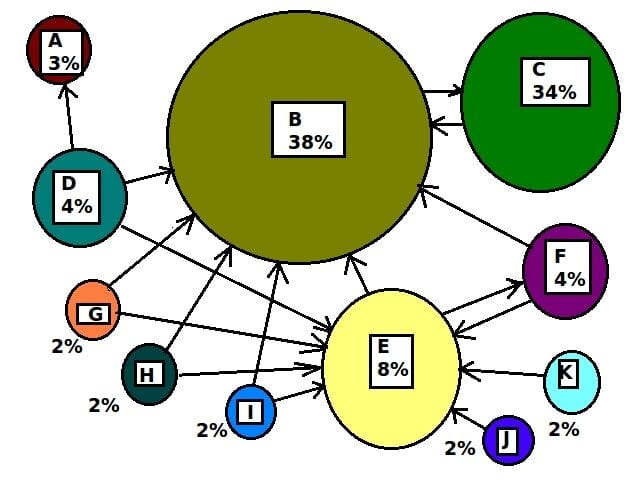In 1996, Stanford University had the privilege of accommodating Larry Page and Sergey Brin as they were working on the mathematical properties of the initial Google ranking system. Simply put, their research brought interlinking into the ranking equation. This equation went on to be known as the PageRank (PR) – after Larry Page of course.
What is PageRank?
PageRank counts the number and quality of links that lead to a page in order to roughly determine how important that website really is. The more important a website is, the more likely they are to receive links from other websites. What happened then? PageRank increased the quality of results so much that, within a ten year span, Google went from a small startup, to processing 4 out of every 5 search queries online (Davies, 2020). A huge achievement at the time.
A Very Brief History of PageRank
Initial Brew
After developing the PageRank algorithm in order to optimise the Google search engine, Page and Brin applied for a patent on their technology with Stanford University in 1997. Google received exclusive rights for the technology in return for 1.8 million shares in Google (Savage, 2005). The university held the patent on the technology, which it licensed to Google until the patent expired in 2018.
Launch
In 2000, a small bar was added to Google’s search toolbar ranging from 0/10 to 10/10 (Clarification: I’m not referring to the type of bar where you go to get drinks). This PageRank bar reported how good of a result a website was for any given search.
This also solved a very big problem with search at the time, which was the extreme difficulty of determining the value of pages purely based on the content and meta tags (Davies, 2014). It’s challenging to imagine the internet before keyword tags were efficient, now that everything is so carefully structured.
Exploitation
What happened next? Opportunists realised that websites with a high PageRank generated more clicks and conversions compared to websites with a low PageRank. So if more inbound links results in more revenue and clicks, then paying for those links would be a good idea? As it would generate more revenue? This was a no brainer and within no time link auction sites were selling the opportunity to increase your PageRank to the highest bidder. Google clearly wouldn’t like this.
…
What happened a few years later in 2016:
“Google has officially shut down toolbar PageRank to the general public. Meaning, internally Google will still be using the data, but it will no longer be visible to the public.” – Matt Southern (2016).
This is a win for Google as they keep the data private, but a loss for search engine optimisers as they could no longer actively see what Google thinks of their page (or manipulate their PageRank score).
A Small Bonus Tip for Digital Marketers
Don’t be strangers to the concept of PageRank. The original PageRank algorithm has been tweaked, altered, and improved with little public information about the developments. Be mindful that a lack of discourse about the way pages may be ranked now, doesn’t necessarily mean the underlying PageRank foundations don’t exist.
Word on the SEO street is that if you’re linked on a reputable website such as the homepage of a large newspaper, university, or any big website with a positive online reputation, the more likely you are to rank higher on SERPs.
References:
- Davies, D. (2020) Why you should care about PageRank [Online]. Search Engine Journal. (Accessed 6 May 2021)
- Savage, S. (2005) Stanford earns $336 million off Google stock [Online]. RedOrbit. (Accessed 6 May 2021)
- Southern, M. (2016) Google PageRank officially shut its doors to the public [Online]. Search Engine Journal. (Accessed 6 May 2021)





Recent Comments